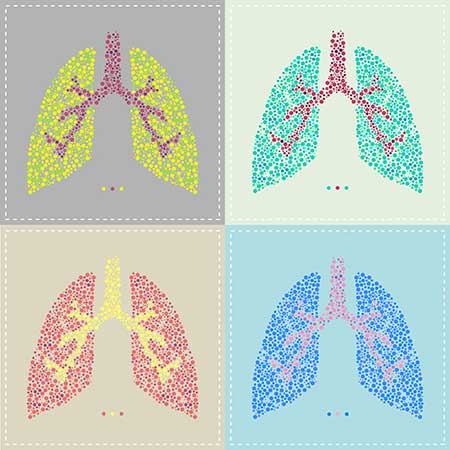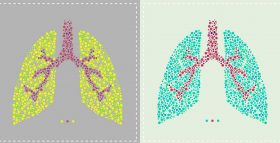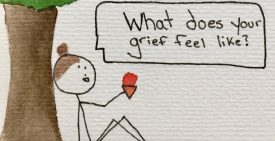 I got the call at 2:30 am on June 24, 2013. I was at a writing residency in Berkeley, Calif., thousands of miles away from my family in New York.
I got the call at 2:30 am on June 24, 2013. I was at a writing residency in Berkeley, Calif., thousands of miles away from my family in New York.
“Your brother passed away.” I felt my lungs clench tight like an iron-clad fist. I’d had asthma since I was a kid but never like this. It took months for that fist to unclench, finger by steely finger.
My older brother, Carlos, was my first best friend. As soon as I started walking, I went off with him to do every wild thing possible, scaling walls and jumping high on the babysitter’s bed trying to touch the ceiling with our toes. He was my first confidante and advocate. When I was being bullied in first grade, he mushed me hard, “Don’t you dare be a punk.” I came at him, all fists and flared nostrils. “Like that, you go at them like that,” he said, laughing.
But something changed when he hit eighth grade. He wouldn’t let me follow him around anymore and one night he stayed out way past his curfew. It was his first act of rebellion.
Over the years, we stayed close, but he became increasingly unreliable. He missed both my boarding school and college graduations. He was too hung over to get out of bed.
I don’t know when my brother started using heroin but when money went missing from wallets and purses during family dinners and my brother disappeared for weeks, we all had to face it: Carlos was a drug addict. He was in and out of rehab for years. I knew he was ashamed of it by the way he avoided my eyes. I never addressed it. It was an unspoken thing between us—he showed me his shame and I didn’t rub it in his face.
Over time, he became harder to deal with. When I saw him, he swore he was clean, but I knew he was lying by the way his face drooped like a bloodhound’s.
On my 35th birthday, he was found overdosed on the street. “I did it on purpose, sis,” he said. I cried for days but didn’t go see him. I didn’t see him for months. I could no longer watch him kill himself.
Then, one day last March, I ran into him at our aunt’s house. We talked for hours. We traced his spiral to when he learned, in eighth grade, that he was the result of a rape. “I’m a sin, sis. The bible says I’m a sin.” I finally understood his addiction and never left him again. We spent the last three months of his life restoring our relationship.
We learned Carlos wasn’t going to make it days before my trip to California. The nightly 104 degree fevers were due to an infection in his blood that damaged his heart. He needed valve-replacement surgery but had destroyed his liver with 15 years of drug abuse. Even if he survived the surgery, he wouldn’t survive the recovery. My Superman was going to die.
In the same sterile room where they’d broken the news to us, I told him I was cancelling my trip. He pushed me away and turned to our mom. I grabbed his chin tenderly, “This is between me and you.” He softened. “You have to go, sis. I’m gonna be okay.”
He died four days later.
My lungs have not been the same since. I didn’t come back to New York right away because I had to honor Carlos’s wish. The community at the VONA/Voices workshops held me like family does. All I did that week was cry and write and smoke a lot of cigarettes. Then I quit in August, yet my asthma didn’t subside. In fact, it got worse.
My lungs first seized in August, in the gym while on a family cruise. I walked slowly to my room, my breath shallow and wheezy. The harsh chemicals used to clean the ship stung my nose and eyes. When I finally reached my cabin, I crawled to the nebulizer sitting at the foot of my bed. That’s when I let myself cry.
It happened again in September. I was running up a hill and jogging back down when I felt my lungs seize midway up the hill. My albuterol inhaler didn’t work. I stripped off my sweatshirt and put my head between my legs. I had to calm myself down. “Chill, V, breathe.”
And yet again, in early November. I was hiking in the woods of Inwood Hill Park in Northern Manhattan. That night, I was writing and felt a sledgehammer hit my chest as soon as I typed “When my brother died.” The thermal I was wearing felt like a straitjacket. I hadn’t moved the nebulizer from next to my bed since I got back from the cruise. I used it four times over the next 12 hours.
There was no denying it— grief had taken hold of my lungs. My herbalist friend wasn’t surprised. “Of course your asthma is exacerbated! Grief is carried in the lungs.” Who knew?
Since then, I’ve been working purposely on regaining strength in my lungs. I coddle and talk to them. I drink teas to clear them out. I’m working out again, meditating and doing breathing exercises. And, I’m confronting my grief in my memoir — about how silence devastated my family and killed my brother.
Holding my grief in caused my lungs to seize. I had to let that grief kill me a little to give me life. I’m still on this journey but now I can breathe.
Grief Bacon is Modern Loss’ series on grief and the body. Read more here.
Vanessa is a New York City-based writer and educator. She is currently completing her first memoir, A Dim Capacity for Wings, and chronicles the journey in her blog.








